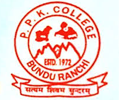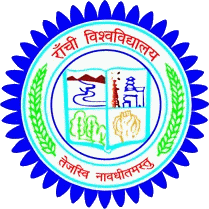

PANCH PARGANA KISAN COLLEGE
A Constituent Unit Of Ranchi University
Bundu, Ranchi, Jharkhand
NAAC Accredited with 1.99 CGPA




A Constituent Unit Of Ranchi University
Bundu, Ranchi, Jharkhand
NAAC Accredited with 1.99 CGPA


The Department of Zoology at PPK College Bundu was established in 1986. The department is dedicated to all aspects of animal life - from anatomy and physiology to evolution and husbandry.Weat the Department of Zoology, are committed to developing science and technology solutions for the world creating world-class approaches to scientific discoveries.Our goal is to develop comprehensive and effective approaches to impart quality training to the students and to cultivate highly skilled z
A. Program Outcomes (FYUGP) 1. PO1: Knowledge of Zoology Concepts Acquire comprehensive knowledge in the fields of zoology, including animal biology, ecology, physiology, genetics, biochemistry, and biotechnology. 2. PO2: Critical Thinking and Problem Solving Develop critical thinking and problem-solving skills, especially in analyzing animal behavior, environmental issues, and biological systems. 3. PO3: Laboratory Skills and Techniques Demonstrate proficiency in various laboratory techniques, such as specimen identification, ecological surveys, molecular biology experiments, and practical applications in biotechnologies. 4. PO4: Research Methodology and Data Analysis Understand research methodologies and data analysis tools, including bioinformatics and statistical methods applied to biological research. 5. PO5: Environmental Awareness and Conservation Show an understanding of conservation biology, wildlife management, and the impact of human activities on ecosystems, with an emphasis on wildlife conservation. 6. PO6: Communication Skills Develop strong scientific communication skills, both written and oral, to convey complex zoological concepts and research findings. 7. PO7: Ethical and Professional Practices Understand and apply ethical considerations in biological research and the practical application of zoological knowledge in industry, conservation, and public health. B. Program Specific Outcomes (PSOs) Upon completion of the Zoology program, students will: 1. PSO1: Mastery in Animal Taxonomy and Classification Demonstrate a deep understanding of animal taxonomy, classification systems, and evolutionary principles, focusing on chordates, non-chordates, and other animal groups. 2. PSO2: Understanding of Animal Physiology and Biochemistry Gain advanced knowledge of animal physiology, biochemistry, and cell biology, and apply this knowledge to understand the functioning of various systems in animals. 3. PSO3: Advanced Molecular Biology Techniques Demonstrate proficiency in molecular biology techniques, including PCR, gel electrophoresis, gene cloning, and bioinformatics tools to study genetics and cellular processes. 4. PSO4: Awareness of Environmental and Ecological Issues Analyze ecological principles and environmental issues, such as climate change, habitat loss, and biodiversity conservation, with a focus on their implications for wildlife and ecosystems. 5. PSO5: Practical and Applied Zoology Develop hands-on expertise in zoology through laboratory courses and fieldwork, with practical knowledge in sericulture, apiculture, wildlife conservation, and public health. Semester I • MJ 1: Non-Chordates and Chordates o CO1: Understand the classification, morphology, and evolutionary significance of non-chordates and chordates. o CO2: Analyze the comparative anatomy of various animal groups. • SEC 1: Wildlife Conservation and Management o CO3: Gain knowledge of wildlife conservation strategies and management techniques. o CO4: Understand the legal and ethical aspects of wildlife protection. Semester II • MJ 2: Ecology and Biochemistry o CO5: Demonstrate a basic understanding of ecological principles and their application to animal populations. o CO6: Understand biochemical processes such as metabolism, enzymes, and molecular interactions in animals. • MJ 3: Practicals-I o CO7: Develop practical skills in identifying non-chordate and chordate species. o CO8: Conduct basic ecological and biochemistry experiments. • SEC 2: Sericulture & Apiculture o CO9: Learn the basics of sericulture (silk farming) and apiculture (beekeeping) for agricultural and economic benefits. o CO10: Understand the biological and commercial aspects of sericulture and apiculture.
A. Program Outcomes (FYUGP) 1. PO1: Knowledge of Zoology Concepts Acquire comprehensive knowledge in the fields of zoology, including animal biology, ecology, physiology, genetics, biochemistry, and biotechnology. 2. PO2: Critical Thinking and Problem Solving Develop critical thinking and problem-solving skills, especially in analyzing animal behavior, environmental issues, and biological systems. 3. PO3: Laboratory Skills and Techniques Demonstrate proficiency in various laboratory techniques, such as specimen identification, ecological surveys, molecular biology experiments, and practical applications in biotechnologies. 4. PO4: Research Methodology and Data Analysis Understand research methodologies and data analysis tools, including bioinformatics and statistical methods applied to biological research. 5. PO5: Environmental Awareness and Conservation Show an understanding of conservation biology, wildlife management, and the impact of human activities on ecosystems, with an emphasis on wildlife conservation. 6. PO6: Communication Skills Develop strong scientific communication skills, both written and oral, to convey complex zoological concepts and research findings. 7. PO7: Ethical and Professional Practices Understand and apply ethical considerations in biological research and the practical application of zoological knowledge in industry, conservation, and public health. B. Program Specific Outcomes (PSOs) Upon completion of the Zoology program, students will: 1. PSO1: Mastery in Animal Taxonomy and Classification Demonstrate a deep understanding of animal taxonomy, classification systems, and evolutionary principles, focusing on chordates, non-chordates, and other animal groups. 2. PSO2: Understanding of Animal Physiology and Biochemistry Gain advanced knowledge of animal physiology, biochemistry, and cell biology, and apply this knowledge to understand the functioning of various systems in animals. 3. PSO3: Advanced Molecular Biology Techniques Demonstrate proficiency in molecular biology techniques, including PCR, gel electrophoresis, gene cloning, and bioinformatics tools to study genetics and cellular processes. 4. PSO4: Awareness of Environmental and Ecological Issues Analyze ecological principles and environmental issues, such as climate change, habitat loss, and biodiversity conservation, with a focus on their implications for wildlife and ecosystems. 5. PSO5: Practical and Applied Zoology Develop hands-on expertise in zoology through laboratory courses and fieldwork, with practical knowledge in sericulture, apiculture, wildlife conservation, and public health. Semester I • MJ 1: Non-Chordates and Chordates o CO1: Understand the classification, morphology, and evolutionary significance of non-chordates and chordates. o CO2: Analyze the comparative anatomy of various animal groups. • SEC 1: Wildlife Conservation and Management o CO3: Gain knowledge of wildlife conservation strategies and management techniques. o CO4: Understand the legal and ethical aspects of wildlife protection. Semester II • MJ 2: Ecology and Biochemistry o CO5: Demonstrate a basic understanding of ecological principles and their application to animal populations. o CO6: Understand biochemical processes such as metabolism, enzymes, and molecular interactions in animals. • MJ 3: Practicals-I o CO7: Develop practical skills in identifying non-chordate and chordate species. o CO8: Conduct basic ecological and biochemistry experiments. • SEC 2: Sericulture & Apiculture o CO9: Learn the basics of sericulture (silk farming) and apiculture (beekeeping) for agricultural and economic benefits. o CO10: Understand the biological and commercial aspects of sericulture and apiculture.
| SL. | Name | Qualification | Regular/Need Based/Guest | Date Of Birth | Date Of Joining | Image |
|---|---|---|---|---|---|---|
| 1' | Dr. Tarkeshwar Kumar (Assistant Professor ) View Profile |
M.Sc. (Gold medalist), NET-JRF, Ph.D., JNU, New Delhi | Regular | 04/09/1991 | 04/03/2022 |
 |


Teachers Performance Good. Regularity Of Class Average. Completion Of Syllabus Poor. Extera Curricular Activity Poor.
Reshma Rani
7541012269
Teachers Performance Average. Regularity Of Class Average. Completion Of Syllabus Average. Extera Curricular Activity Poor.